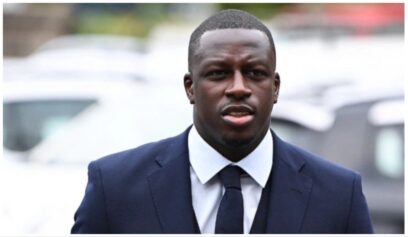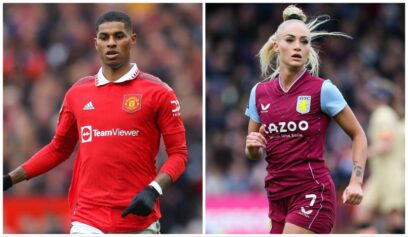She’s smart, knowledgeable, matter-of-fact and loves sports.
Never heard of Andrea Canales? Not surprising. She doesn’t fit the stereotype of what many expect in an American woman covering sports. She’s Hispanic, brunette and bilingual.
And, she writes about soccer.
*
The stereotypical soccer journalist is male and, at least here in America, predominantly white.
Canales blows that stereotype out of the water. She has written on everything from David Beckham to college soccer to MLS to Team USA to El Tri (Mexico). She currently covers Liga MX for ESPN FC.
Born in Michigan to a Puerto Rican father and Nicaraguan mother, her family moved to Argentina when she was two years old, where she spent some of her formative years.
Diego Maradona, Boca Juniors it was a complete immersion in the Argentinian culture and the Spanish language. When her parents sat her down to deliver the news of a move back to America, it was quite the shock.
I grew up thinking I was Argentine, said Canales.
Argentinas life and culture was all she knew. Spanish was her native tongue and soccer was her game. The Canales family landed in Los Angeles when they moved back to America. There, she was reunited with her passion, soccer.
I just started watching the Mexican League because thats what my friends were watching every weekend, said Canales. I found sports in general to be a nice avenue into my new culture.
She continued playing sports in high school until sidelined by injury, but found that she could be a part of the game through writing. The more she wrote, the more she saw herself as a sports journalist. But not everybody sought to feed that dream.
I was warned in college that media was dying, Canales said.
**
Media transformation
Despite the dire forecast, she forged ahead, but with a back-up plan. Returning to school for her Masters Degree, she continued to write about sports for the school paper. With a teaching job in hand, she immersed herself in sports via the internet. She caught the attention of a betting site looking for a soccer writer. They wanted to expand beyond the place your bet mentality and provide their customers with real information.
She was not paid for the work, but it didn’t matter. She just wanted to write. When the site faded away, she sought other opportunities.
I started writing for a lot of different sites because I realized that media was NOT dead, she said. It had just transformed.
In 2005, an opportunity with the World Wide Leader in sports came knocking. Back then, ESPN called it Soccernet. A friendly between Real Madrid and the LA Galaxy brought their editor into town.
He was having trouble asking questions to the players who spoke only Spanish, Canales said.
She saw an opportunity and seized it, offering to translate. She initially get her feet wet on the women’s college soccer beat before moving on to Major League Soccer (MLS), where she began covering the Galaxy, and a certain global superstar named David Beckham.
For a while, I was exclusively on the Beckham Beat, she said. I had three articles every week just on Beckham.
Following her tenure at Soccernet, Canales became an assistant editor at LA Soccer News before moving on to Goal.com. As the only female editor, Canales worked with young writers and helped amp up the site’s profile. They succeeded so much so that ownership of Goal.com changed, as did the vision.
They got bought out by a bigger company and kind of revamped everything, said Canales.
A new editing team brought change and frustration. She returned to teaching after leaving Goal.com, but the writing bug persisted. An ESPN opportunity came knocking again, this time with ESPN FC. It was a return to her roots.
I got the call to do a phone interview to write part-time for ESPN and this time to be a dedicated writer on the Mexican League, she said. I had covered the Mexican National Team before, but never the Mexican League. It just felt like it was coming back full circle because that was the first league I got into when I came back to the United States.
**
Challenges for a female sports journalist
Female sports journalists being held to different standards isn’t new. Sports Illustrated’s Richard Deitsch spoke with several women
One of the topics addressed was something that Canales herself had to face.
Imagine you’re a female reporter. Alongside your male counterparts, you’re getting ready to
interview a player in a post-match locker room. Before you’re realize what’s happening, another
player grabs your arm and ushers you out of the room. You try to explain in his native language,
Spanish, that you were doing your job. He dismisses you as if you didn’t matter. He tells you,
in no uncertain terms, you don’t belong.
No one intervenes.
No one explains to him that you have a right to be there.
You’re just…alone.
The above exchange between player and reporter happened to Canales (read more here) in 2007. It highlighted the struggle women have had, and continue to have, in covering men’s sports. It also highlighted the machismo mindset that sometimes exists in Latin cultures.
I think, sadly enough, that part of the reason why my incident happened is because, once again, there was a little bit of a culture difference, says Canales. I guess now I would put it on Twitter. Back then, I had only a blog.
Even without Twitter, the backlash was intense.
I was surprised at some of the vitriol of which I was attacked, she said. I knew some of it was Columbus Crew fans feeling like I had slighted their team by mentioning the actions of some of the players. In my mind, it was just anything a reporter does – this happens, where something happens and we let the public know about it. In my mind, if it happened it needs to be known. What political agenda am I serving by shoving it underneath?
Face it, the locker room isnt always…I mean, especially when teams win, guys go into this mode, theyre excited, throwing underwear at each other, Canales continued. Its very frat boy sometimes. Thats what I walked into when I walked into that locker room. I think maybe in his mind he saw this and was like, it was totally wrong for her to see this.
To protect meant to get her out of there by pushing her out.
Canales remembers how Beckham would use a side entrance in between the locker room and shower area. Before ever approaching the public locker room, where media was waiting. Beckham would make sure he was fully dressed.
Today, a player escorting a female reporter out of the locker room would be on Twitter instantly. Every blogging website and sports talk show would post and dissect it.
The unwritten rules between what female sports journalists have to adhere to versus their male counterparts can be especially frustrating.
Unfortunately, there will always be the bias against women sharing their opinions openly about the sport, said Kim Tate, former writer and current Digital Media Manager (English) for Santos Laguna. [Andrea] doesnt strike me as the kind of person who cares what others will think or say. I think shes true to her values of what she sees as real journalism and isnt afraid to sacrifice what she feels is right or true for the sake of trying to please anyone be it federations, teams, fans, or other journalists.
Canales is part of a small minority in American sports media a bilingual Latina covering a male-dominated sport. For her, it’s about the sport she loves.
Given her unique role in sports media, she has the opportunity to help bridge cultural gaps.
She speaks Spanish and English and has a lot of experience covering both the United States and Mexico, as well as the two domestic leagues, Andrea is in an excellent position to balance opinions about both, said her ESPN FC colleague Tom Marshall.
Knowledgeable. Fearless. Bi-cultural. Andrea Canales is breaking barriers and opening doors through her talent and passion, challenging perceptions and outdated stereotypes along the way.



